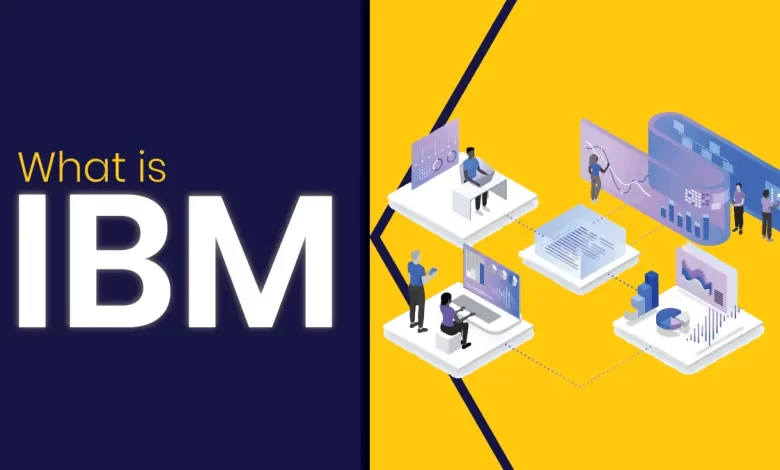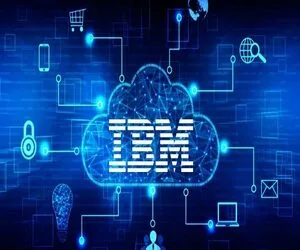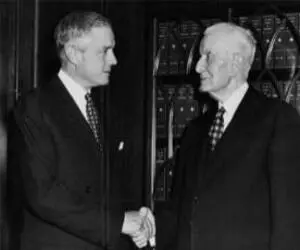What is IBM – International Business Machines Corporation

International Business Machines Corporation (IBM) is an American multinational technology corporation headquartered in Armonk, New York, with operations in more than 171 countries. IBM the company began in 1911, founded as the Computing-Tabulating-Recording slot hongkong Company (CTR) in Endicott, New York by trust businessman Charles Ranlett Flint, and changed its name to “International Business Machines” in 1924. IBM incorporates in New York.
IBM produces and sells computer hardware, middleware and software, and contributes hosting and consulting services in areas ranging from mainframe computers to nanotechnology. IBM is also a major research organization, which holds the record for most annual US patents generated by a business (as of 2021) for 29 consecutive years.
Table of Contents
What is IBM?

Business Machines Corporation, the leading American computer manufacturer, has a large market share both in the United States and abroad. IBM headquarters is located in Armonk, New York.
It was incorporated in 1911 as the Computing-Tabulating-Recording Company in a consolidation of three smaller companies that made punch-card tabulators and other office products. IBM the company assumed its current name in 1924 under the leadership of Thomas Watson, a man of considerable marketing acumen, who became general manager in 1914 and by 1924 had gained complete control of the firm. IBM Punch-card tabulating systems used by governments and private businesses. IBM also developed a highly disciplined and competitive sales force that adapted the company’s custom-built tabulating systems to the needs of particular clients.
History of IBM
IBM was founded in 1911 as the Computing-Tabulating-Recording Company (CTR) in Endicott, New York, and changed its name to “International Business Machines” in 1924. IBM is incorporated in New York and has operations in more than 170 countries.
In the 1880s, technologies emerged that would eventually form the core of International Business Machines (IBM). Julius E. Pitrap patented the computing scale in 1885; Alexander Day invented the dial recorder (1888); Herman Hollerith (1860–1929) patented the electric tabulating machine; And Willard Bundy invented a time clock in 1889 to record the arrival and departure times of an employee on a paper tape. On June 16, 1911, four of his companies were amalgamated in New York State by Charles Ranlett Flint, creating a fifth company as the Computing-Tabulatine Recording Company (CTR), based in Endicott, New York. The five companies had 1,300 workers and offices and plants in Endicott and Binghamton, New York; Dayton, Ohio; Detroit, Michigan; Washington D.C.; more toronto.
IBM Products and Services
Server hardware
Five decades after the launch of the IBM System/360, the company continues to sell mainframe-class computers. IBM positions its z Systems product line as enterprise infrastructure for the cognitive businesses of its customers. IBM targets a number of solutions for its z-series products, including analytics, block chain, cloud, and DevOps.
Storage
On the hardware side, IBM offers products that include FlashSystems all-flash arrays, StoreWise systems and other hybrid arrays, Fiber Channel storage-area network hardware, storage media, and tape products. The company is pushing into software-defined storage with its Spectrum storage suite and CleverSafe object storage technology.
Software
IBM’s diverse software line includes analytics offerings such as IBM Cognos Analytics, IBM SPSS, IBM Maximo Asset Management, and DB2. Many of IBM’s products in this area came through acquisitions: the company bought Maximo in 2006, Cognos in 2008, and SPSS in 2009. IBM also provides IT infrastructure software, including its WebSphere Application Server and MQ messaging middleware.
Services
IBM’s service units include Global Business Services, which includes Big Blue’s management consulting operations, and Global Technology Services, which provides mobility, networking, business continuity, and outsourcing, among other services.
Cloud
IBM’s SmartCloud software and services offering began in 2011. The move followed the acquisition of SoftLayer Technologies Inc. by IBM In 2013, which is an infrastructure as a service provider.
Cognitive Offering
The IBM Watson supercomputer, which pulls together artificial intelligence and analytical software, is the company’s flagship cognitive computing offering. Several technologies and discrete products have grown out of IBM’s cognitive computing system and its related research.
Research and development of IBM

Thomas J. Watson Jr., who succeeded his father as CEO of IBM in 1956, put the company on a research and development track. Big Blue’s research center, launched in 1961, includes research laboratories in Yorktown Heights, NY, and Cambridge, Mass., as well as an industry solutions laboratory in Hawthorne, NY, in a notable development of IBM’s research centre for dynamic random access memory. Invention and the FORTRAN language more recent research efforts include blockchain, quantum computing, and cognitive technology.
What does IBM do?
Our clients’ systems support modern society. In making them faster, more productive, and more secure, we don’t just make businesses work better. We work to better the world. We bring together essential technology and services, regardless of where those solutions come from, to help customers solve their most pressing business problems.
How does IBM make money?
The main profit centre of IBM is its software segment. International Business Machines Corp. (IBM) sells a wide range of products and services, involving software, consulting, and hybrid cloud infrastructure. The company also provides financing services to its customers to facilitate their acquisition of information technology (IT) systems, software, and services. The company has clients in over 175 countries and competes with hundreds of companies, ranging from small businesses to large multinational corporations.
Conclusion
IBM is a wonderful company that consistently outperforms its competitors. It continues to play a leading role in the technological advances shaping our future, and they understand their responsibility to society as these new innovations are created. IBM is a valuable asset to its customers, providing incredible solutions to a plethora of problems a business may face. Using data analytics through AI or cloud data storage, IBM allows its customers to save money, time and resources so that customers can be better businesses for tomorrow.
FAQs
1. What is IBM?
IBM integrates technology and expertise, providing infrastructure, software(including market-leading Red Hat), and consulting services to clients as they advance the digital transformation of the world’s mission-critical businesses.
2. What does IBM do in India?
IBM India Pvt Ltd provides Information Technology Services. The company offers business and technical consulting, training and support, data storage, analytics, networks and enterprise applications. IBM India serves clients worldwide.
3. What is IBM’s largest product?
When we talk IBM then IBM sells software, provides consulting services, and offers hybrid cloud infrastructure solutions. The software segment is IBM’s largest source of revenue and profits.
4. Is it difficult to get a job at IBM?
Yes, getting a job at IBM is tough. The company is known for an extremely rigorous recruitment process, with four interview rounds lasting an hour each. The difficulty rating for the interview process at IBM was rated 2.9 out of five.
5. How is the IBM interview process?
When you complete the first round of the IBM recruitment process, i.e., the written round, you will get the mail regarding the confirmation for the next round, which is the interview round. The interview round is divided into two parts: Technical Round. HR round.
6. What does IBM stand for?
IBM (International Business Machines) ranks among the largest information technology companies in the world, providing a wide spectrum of hardware, software, and service offerings.
7. Is IBM a good company?
1. Nice place to work.
2. All the co-workers are extremely helpful. Excellent projects, but I’ve seen people sit on the bench for a long time. There is nothing great about IBM other than its work. It’s a huge organization, so people who have been at IBM for a long time get all the recognition and rewards.
8. What are the qualities required to get a job at IBM?
Whether you’re ready to take the next step in your career, or are considering a job change, IBM has a variety of offerings—including free online education, flagship programs, expert support, and badge certificates—that will help you make the most of your career. Helping you reach your goals
Observation.
Analytics
Artificial intelligence.
Block Chain.
The clouds
Enterprise computing.
Enterprise-design thinking.
The Internet of Things.



